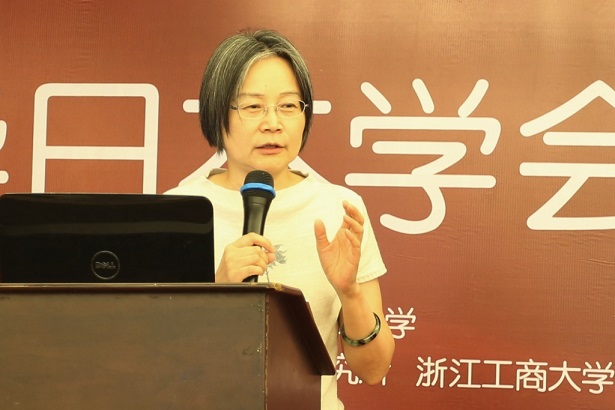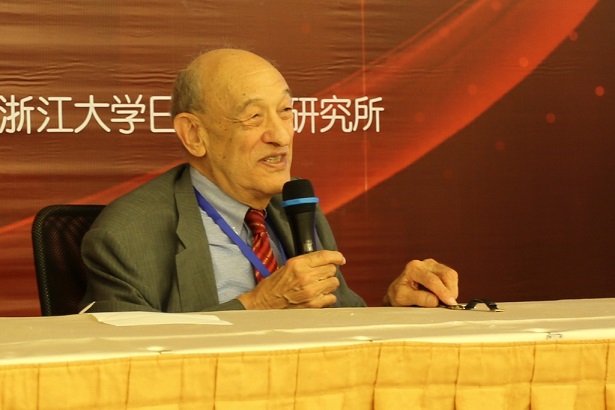|
2016 is the landmark year of Japan’s 60th anniversary as a United Nations Member State, and the 70th anniversary of Japanese “Postwar Constitution”. The increasing integration of the world in the form of “globalization” has enriched life and economic interdependence in East Asia but the geopolitics in this region is also creating new problems. While China and Japan loom large on the conflict matrix in East Asia, the development of interstate cultural exchange, political and social cooperation in this region is slow, giving us something to worry about beyond the territorial disputes. In the perspective of East Asia, what will the future of China-Japan relations look like? For the most part, Japan is a country with a high degree of domestic tranquility. Yet this country faces a number of problems such as the future role of Japan in East Asia, aging population, Japan’s political drift toward the right and prolonged economic recession that began in the 1990s but showed no real recovery under Abenomics. How to conduct research on Japan under such circumstances? In order to offer a unique opportunity for open discussions on all these topics with an array of more than one hundred high-level Chinese experts, scholars, media editors and representatives of Japanese institutions in China, the annual meeting and multi-disciplinary academic conference of Chinese Association For Japanese Studies were held at Zhejiang Gongshang University on 1 and 2 July 2016. The overlying theme of this year’s conference was “Japanese Studies in East Asian Perspective” (东亚视阈下的日本研究),which was co-hosted by the Chinese Association For Japanese Studies, Zhejiang Gongshang University and undertaken by the Institute of East Asian Studies (IEAS) at the Zhejiang Gongshang University, the Japanese Studies Institute at the Chinese Academy of Social Sciences, and the Japanese Culture Research Institute at the Zhejiang University. Sponsors included Shanghai Jiao Tong University Press, Japan Foundation and Zhejiang Federation of Humanities and Social Sciences Circles.
On 1 July 2016, Professor CHEN Xiaofa, the Vice-Director of IEAS and Vice-Secretary of the Chinese Association For Japanese Studies, had the pleasure of official opening ceremony and welcome speech. The plenary session then started with the addresses of three speakers: Dr LI Wei (李薇the Chairwoman of the Chinese Association For Japanese Studies), Professor Su Weihua (苏为华the Vice-President of Zhejiang Gongshang University) and Mr TANG Jiaxuan’s (唐家璇 ex-State Councilor of the People’s Republic of China and the Chairman of China-Japan Friendship Association )written address. Professor GAO Hong (高洪the Secretary of Party Committee of Japanese Studies Institute at the Chinese Academy of Social Sciences, and the Standing Vice-Chairman of Chinese Association For Japanese Studies) then presented A Report on Current Circumstances of China-Japan Relations in which he concisely discussed the present hiatus and the bilateral mechanism for thawing ties. Nine Vice-Chairmen also gave account of the regional activities of Chinese Association For Japanese Studies in the past one year. Professor WANG Yong reported on behalf of the Zhejiang region.
On 2 July 2016, before the conference on “Japanese Studies in East Asian Perspective”, Professor GAO Hong (高洪Standing Vice-Chairman of Chinese Association For Japanese Studies), Mr TAKAHASHI Kouichirou (高桥耕一郎Officer-in-Charge of the Beijing Cultural Center of Japan Foundation) and Mr SHAO Qing (邵清Vice-Chairman of Zhejiang Federation of Humanities and Social Sciences Circles and Mr HAN Jianmin (韩建民Director of Shanghai Jiao Tong University Press) delivered congratulatory speeches. In celebration of the publication of five bound volumes of Li Dai Yi Ben Zhuang Kao Zhu (历代正史日本传考注Glossary Explanations and Bibliographic Annotations of Japan in Official Chinese Dynastic History), which were analyzed by professors of IEAS and edited by Professor WANG Yong, ceremony for presenting this analytical collection of primary data to academic institutions was performed.
The spotlight of the conference in the morning session of 1 July 2016 is Professor Ezra F. Vogel’s keynote speech on China and Japan. He is the Henry Ford II Professor of the Social Sciences Emeritus at Harvard University, the ex-Director of the Fairbank Center (1995-1999) and the first Director of the Asia Center (1997-1999) in the same University. In 2013, he was presented the Award for Outstanding Contribution to China Studies at the opening session of the fifth World Forum on China Studies. On 1 July 2016, his speech is full of words of inspiration and wisdom to guide the flight path of research on China-Japan relations in East Asian perspective. In the same conference, Professor HAN Dongyu (韩东育 the Vice-President of Northeast Normal University) and Professor WANG Yong of IEAS also presented their research methodologies on Chinese studies, Japanese studies and East Asian studies.
The sub-themes of the Conference in the afternoon session included group discussions on the Treaty of Mutual Cooperation and Security between the United States and Japan, Japanese politics and foreign relations. Chinese experts in Japanese studies also presented their research findings on Japanese economic development, society and culture. Chairwoman LI Wei delivered the concluding remarks. It is a great honor of IEAS at the Zhejiang Gongshang University to co-host Professor Ezra Vogel and so many distinguished scholars of Japanese studies from all over China. While China-Japan relations has become more and more complex as time has gone by, this Conference does create a stimulating intellectual environment for our further academic research.


|
